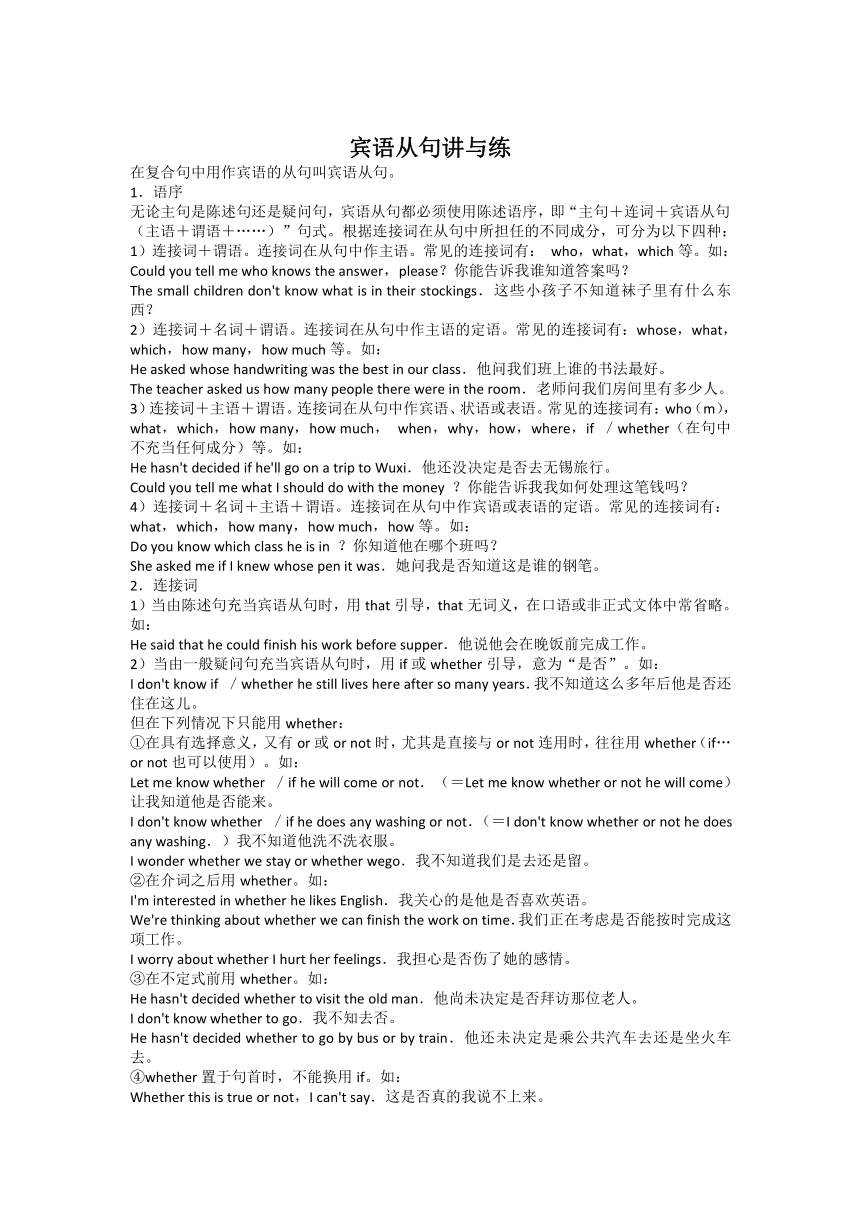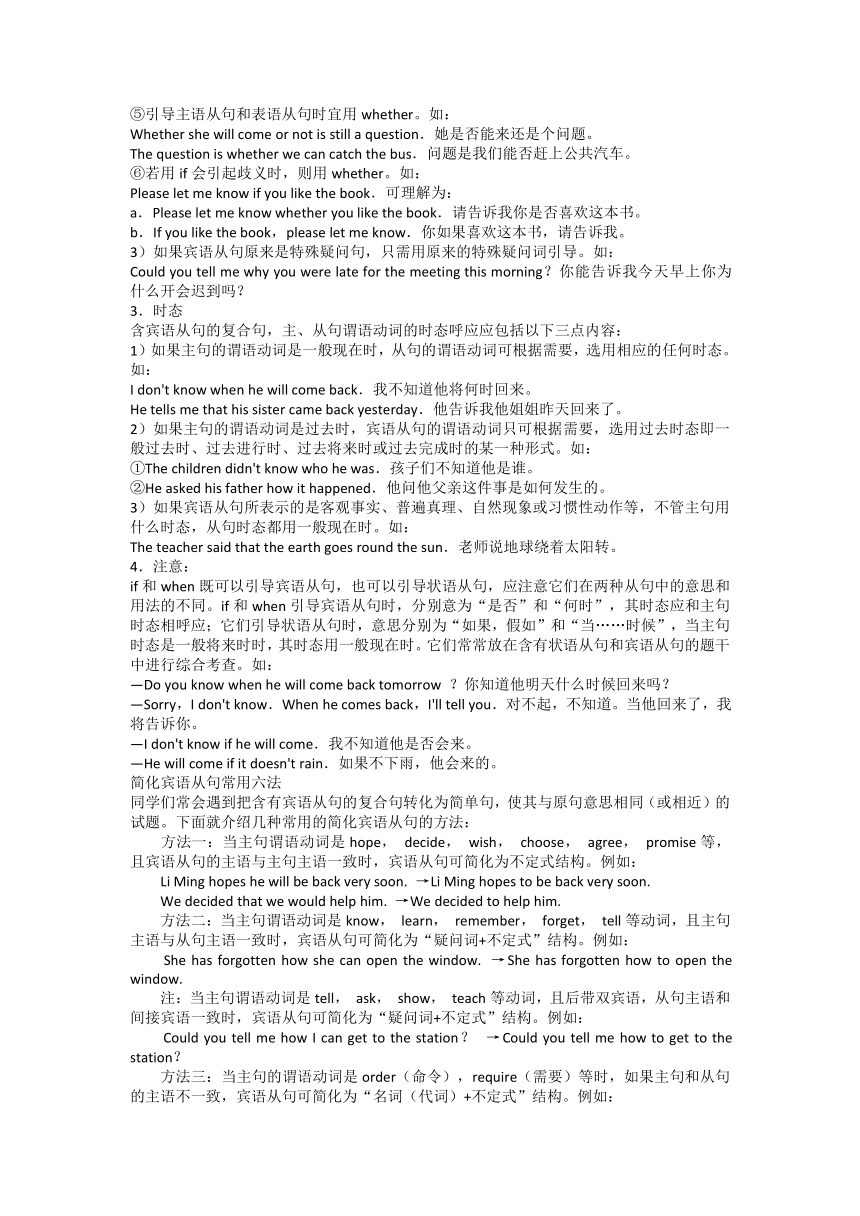2022届高考英语二轮复习:宾语从句讲解 学案
文档属性
| 名称 | 2022届高考英语二轮复习:宾语从句讲解 学案 |  | |
| 格式 | docx | ||
| 文件大小 | 26.6KB | ||
| 资源类型 | 教案 | ||
| 版本资源 | 通用版 | ||
| 科目 | 英语 | ||
| 更新时间 | 2021-08-24 18:37:12 | ||
图片预览


文档简介
宾语从句讲与练
在复合句中用作宾语的从句叫宾语从句。
1.语序
无论主句是陈述句还是疑问句,宾语从句都必须使用陈述语序,即“主句+连词+宾语从句(主语+谓语+……)”句式。根据连接词在从句中所担任的不同成分,可分为以下四种:
1)连接词+谓语。连接词在从句中作主语。常见的连接词有:
who,what,which等。如:
Could
you
tell
me
who
knows
the
answer,please?你能告诉我谁知道答案吗?
The
small
children
don't
know
what
is
in
their
stockings.这些小孩子不知道袜子里有什么东西?
2)连接词+名词+谓语。连接词在从句中作主语的定语。常见的连接词有:whose,what,which,how
many,how
much等。如:
He
asked
whose
handwriting
was
the
best
in
our
class.他问我们班上谁的书法最好。
The
teacher
asked
us
how
many
people
there
were
in
the
room.老师问我们房间里有多少人。
3)连接词+主语+谓语。连接词在从句中作宾语、状语或表语。常见的连接词有:who(m),what,which,how
many,how
much,
when,why,how,where,if
/whether(在句中不充当任何成分)等。如:
He
hasn't
decided
if
he'll
go
on
a
trip
to
Wuxi.他还没决定是否去无锡旅行。
Could
you
tell
me
what
I
should
do
with
the
money
?你能告诉我我如何处理这笔钱吗?
4)连接词+名词+主语+谓语。连接词在从句中作宾语或表语的定语。常见的连接词有:what,which,how
many,how
much,how等。如:
Do
you
know
which
class
he
is
in
?你知道他在哪个班吗?
She
asked
me
if
I
knew
whose
pen
it
was.她问我是否知道这是谁的钢笔。
2.连接词
1)当由陈述句充当宾语从句时,用that引导,that无词义,在口语或非正式文体中常省略。如:
He
said
that
he
could
finish
his
work
before
supper.他说他会在晚饭前完成工作。
2)当由一般疑问句充当宾语从句时,用if或whether引导,意为“是否”。如:
I
don't
know
if
/whether
he
still
lives
here
after
so
many
years.我不知道这么多年后他是否还住在这儿。
但在下列情况下只能用whether:
①在具有选择意义,又有or或or
not时,尤其是直接与or
not连用时,往往用whether(if…or
not也可以使用)。如:
Let
me
know
whether
/if
he
will
come
or
not.(=Let
me
know
whether
or
not
he
will
come)让我知道他是否能来。
I
don't
know
whether
/if
he
does
any
washing
or
not.(=I
don't
know
whether
or
not
he
does
any
washing.)我不知道他洗不洗衣服。
I
wonder
whether
we
stay
or
whether
wego.我不知道我们是去还是留。
②在介词之后用whether。如:
I'm
interested
in
whether
he
likes
English.我关心的是他是否喜欢英语。
We're
thinking
about
whether
we
can
finish
the
work
on
time.我们正在考虑是否能按时完成这项工作。
I
worry
about
whether
I
hurt
her
feelings.我担心是否伤了她的感情。
③在不定式前用whether。如:
He
hasn't
decided
whether
to
visit
the
old
man.他尚未决定是否拜访那位老人。
I
don't
know
whether
to
go.我不知去否。
He
hasn't
decided
whether
to
go
by
bus
or
by
train.他还未决定是乘公共汽车去还是坐火车去。
④whether置于句首时,不能换用if。如:
Whether
this
is
true
or
not,I
can't
say.这是否真的我说不上来。
⑤引导主语从句和表语从句时宜用whether。如:
Whether
she
will
come
or
not
is
still
a
question.她是否能来还是个问题。
The
question
is
whether
we
can
catch
the
bus.问题是我们能否赶上公共汽车。
⑥若用if会引起歧义时,则用whether。如:
Please
let
me
know
if
you
like
the
book.可理解为:
a.Please
let
me
know
whether
you
like
the
book.请告诉我你是否喜欢这本书。
b.If
you
like
the
book,please
let
me
know.你如果喜欢这本书,请告诉我。
3)如果宾语从句原来是特殊疑问句,只需用原来的特殊疑问词引导。如:
Could
you
tell
me
why
you
were
late
for
the
meeting
this
morning?你能告诉我今天早上你为什么开会迟到吗?
3.时态
含宾语从句的复合句,主、从句谓语动词的时态呼应应包括以下三点内容:
1)如果主句的谓语动词是一般现在时,从句的谓语动词可根据需要,选用相应的任何时态。如:
I
don't
know
when
he
will
come
back.我不知道他将何时回来。
He
tells
me
that
his
sister
came
back
yesterday.他告诉我他姐姐昨天回来了。
2)如果主句的谓语动词是过去时,宾语从句的谓语动词只可根据需要,选用过去时态即一般过去时、过去进行时、过去将来时或过去完成时的某一种形式。如:
①The
children
didn't
know
who
he
was.孩子们不知道他是谁。
②He
asked
his
father
how
it
happened.他问他父亲这件事是如何发生的。
3)如果宾语从句所表示的是客观事实、普遍真理、自然现象或习惯性动作等,不管主句用什么时态,从句时态都用一般现在时。如:
The
teacher
said
that
the
earth
goes
round
the
sun.老师说地球绕着太阳转。
4.注意:
if和when既可以引导宾语从句,也可以引导状语从句,应注意它们在两种从句中的意思和用法的不同。if和when引导宾语从句时,分别意为“是否”和“何时”,其时态应和主句时态相呼应;它们引导状语从句时,意思分别为“如果,假如”和“当……时候”,当主句时态是一般将来时时,其时态用一般现在时。它们常常放在含有状语从句和宾语从句的题干中进行综合考查。如:
—Do
you
know
when
he
will
come
back
tomorrow
?你知道他明天什么时候回来吗?
—Sorry,I
don't
know.When
he
comes
back,I'll
tell
you.对不起,不知道。当他回来了,我将告诉你。
—I
don't
know
if
he
will
come.我不知道他是否会来。
—He
will
come
if
it
doesn't
rain.如果不下雨,他会来的。
简化宾语从句常用六法
同学们常会遇到把含有宾语从句的复合句转化为简单句,使其与原句意思相同(或相近)的试题。下面就介绍几种常用的简化宾语从句的方法:
方法一:当主句谓语动词是hope,
decide,
wish,
choose,
agree,
promise等,且宾语从句的主语与主句主语一致时,宾语从句可简化为不定式结构。例如:
Li
Ming
hopes
he
will
be
back
very
soon.
→Li
Ming
hopes
to
be
back
very
soon.
We
decided
that
we
would
help
him.
→We
decided
to
help
him.
方法二:当主句谓语动词是know,
learn,
remember,
forget,
tell等动词,且主句主语与从句主语一致时,宾语从句可简化为“疑问词+不定式”结构。例如:
She
has
forgotten
how
she
can
open
the
window.
→She
has
forgotten
how
to
open
the
window.
注:当主句谓语动词是tell,
ask,
show,
teach等动词,且后带双宾语,从句主语和间接宾语一致时,宾语从句可简化为“疑问词+不定式”结构。例如:
Could
you
tell
me
how
I
can
get
to
the
station?
→Could
you
tell
me
how
to
get
to
the
station?
方法三:当主句的谓语动词是order(命令),require(需要)等时,如果主句和从句的主语不一致,宾语从句可简化为“名词(代词)+不定式”结构。例如:
The
headmaster
ordered
that
we
should
start
at
once.
→
The
headmaster
ordered
us
to
start
at
once.
方法四:某些动词后的宾语从句,可以用介词加动名词(短语)等其他形式简化。例如:
He
insisted
that
he
should
go
with
us.
→He
insisted
on
going
with
us.
The
poor
boy
doesn’t
know
when
and
where
he
was
born.
→The
poor
boy
doesn’t
know
the
time
and
the
place
of
his
birth.
方法五:某些动词后面的宾语从句可转化为“宾语+V-ing形式(作宾语补足语)”结构。例如:
Liu
Ping
found
that
there
was
a
wallet
lying
on
the
ground.
→
Liu
Ping
found
a
wallet
lying
on
the
ground.
方法六:动词seem后的宾语从句,也可以用不定式(短语)来简化,但句型需要进行适当的变化。例如:
It
seemed
that
the
boys
were
going
to
win.
→The
boys
seemed
to
win.
除上述方法外,还有一些特殊句式的转化。例如:
I
found
that
it
was
difficult
to
learn
English
well.
→I
found
it
difficult
to
learn
English
well.
Soon
we
found
that
the
ground
was
covered
with
thick
snow.
→Soon
we
found
the
ground
covered
with
thick
snow.
They
found
that
the
box
was
very
heavy.
→They
found
the
box
very
heavy.
I.
单项填空
1.(2019·北京卷·语法填空)What
students
do
at
college
seems
to
matter
much
more
than?___8___?they
go.
【答案】where
【解析】考查宾语从句。句意:学生在大学里做什么似乎比去哪里(哪所大学)更重要。这里表达去哪所大学,表示地点,作状语。故用where。
2.
(2017·天津)
She
asked
me
___________
I
had
returned
the
books
to
the
library,
and
I
admitted
that
I
hadn’t.
A.
when
B.
where
C.
whether
D.
what
【答案】C
【解析】句意:她问我是否已经把书还给图书馆了,我承认我还没有还。A.
什么时候;B.
在哪里;C.
是否;D.
什么。根据句意,故选C。
3.
(2017·北京)
Jane
moved
aimlessly
down
the
tree-lined
street,
not
knowing
____________she
was
heading.
A.
why
B.
where
C.
how
D.
when
【答案】B
【解析】A.
why
为什么;B.
where
在哪儿;C.
how
如何;D.
when什么时候。句意:Jane漫无目的地走在两旁树木成行的街道上,不知道她将去往何方。根据语境可知此处是表地点的,很容易就可选出答案B。
4.
(2017·江苏)
We
choose
this
hotel
because
the
price
for
a
night
here
is
down
to
$20,
half
of
____________
it
used
to
charge.
A.
that
B.
which
C.
what
D.
how
【答案】C
【解析】考查同位语和宾语从句。"half
of
_________
it
used
to
charge"是$20的同位语,即原来价格的一半是现在的$20;另外,of后跟名词或名词短语构成介宾短语,所以这里是宾语从句;宾语从句中的charge后面缺少宾语,所以用what来引导宾语从句,并充当宾语从句的宾语,故选C。
5.
(2015·湖南)You
have
to
know
_____________
you’re
going
if
you
are
to
plan
the
best
way
of
getting
there.
A.
what
B.
that
C.
where
D.
who
【答案】C
【解析】根据分析可知,You
have
to
know…后面是一个宾语从句。_____________
you’re
going
if
you
are
to
plan
the
best
way
of
getting
there中缺少地点状语,所以应该用连接副词where来引导从句。句意:如果你已经计划好去那里的最佳方案,你必须知道你将要去哪里。故选C。
6.
(2015·北京)I
truly
believe
_____________
beauty
comes
from
within.
A.
that
B.
where
C.
what
D.
why
【答案】A
【解析】句意:我真的相信美丽源自于内在。本题考查宾语从句。从句部分不缺少任何成分,因此用that,that起到连接作用,也可以省略。故选A。
7.
(2015·浙江)If
you
swim
in
a
river
or
lake,
be
sure
to
investigate
_____________
is
below
the
water
surface.
Often
there
are
rocks
or
branches
hidden
in
the
water.
A.
what
B.
who
C.
that
D.
whoever
【答案】A
【解析】句意:如果你在河里或湖里游泳,请确定查看水面下有什么。通常总有一些石头或树枝藏在水里。分析宾语从句的成分可以发现,空格所作的成分是主语,且表示"什么",根据下一句的表述中的树枝和石头可以得出答案是what。
8.
(2015·重庆)We
must
find
out
_____________
Karl
is
coming,
so
we
can
book
a
room
for
him.
A.
when
B.
how
C.
where
D.
why
【答案】A
【解析】句意:我们必须弄明白卡尔什么时候来,这样我们能给他预定房间。find
out
后面跟着宾语从句,根据句意选when,when在从句中作时间状语。
9.
(2015·陕西)Reading
her
biography,
I
was
lost
in
admiration
for
_____________
Doris
Lessing
had
achieved
in
literature.
A.
what
B.
that
C.
why
D.
how
【答案】A
【解析】句意:读完了她的自传后,我对Doris
Lessing在文学上做的贡献非常敬佩。介词for后面是宾语从句,从句中缺少宾语,所以选A。
10.
(2015·福建)I
wonder
_____________
Mary
has
kept
her
figure
after
all
these
years.
—By
working
out
every
day.
A.
where
B.
how
C.
why
D.
If
【答案】B
【解析】考查宾语从句。句意:——我好奇玛丽在这些年是怎么保持着身材的。——通过每天锻炼。句中I是主语,wonder是谓语,how引导的从句在整个句子中作宾语。连接副词how在宾语从句中作方式状语。句子是用表示方式的by短语回答的,所以是针对方式提问的,故用how。故选C。
在复合句中用作宾语的从句叫宾语从句。
1.语序
无论主句是陈述句还是疑问句,宾语从句都必须使用陈述语序,即“主句+连词+宾语从句(主语+谓语+……)”句式。根据连接词在从句中所担任的不同成分,可分为以下四种:
1)连接词+谓语。连接词在从句中作主语。常见的连接词有:
who,what,which等。如:
Could
you
tell
me
who
knows
the
answer,please?你能告诉我谁知道答案吗?
The
small
children
don't
know
what
is
in
their
stockings.这些小孩子不知道袜子里有什么东西?
2)连接词+名词+谓语。连接词在从句中作主语的定语。常见的连接词有:whose,what,which,how
many,how
much等。如:
He
asked
whose
handwriting
was
the
best
in
our
class.他问我们班上谁的书法最好。
The
teacher
asked
us
how
many
people
there
were
in
the
room.老师问我们房间里有多少人。
3)连接词+主语+谓语。连接词在从句中作宾语、状语或表语。常见的连接词有:who(m),what,which,how
many,how
much,
when,why,how,where,if
/whether(在句中不充当任何成分)等。如:
He
hasn't
decided
if
he'll
go
on
a
trip
to
Wuxi.他还没决定是否去无锡旅行。
Could
you
tell
me
what
I
should
do
with
the
money
?你能告诉我我如何处理这笔钱吗?
4)连接词+名词+主语+谓语。连接词在从句中作宾语或表语的定语。常见的连接词有:what,which,how
many,how
much,how等。如:
Do
you
know
which
class
he
is
in
?你知道他在哪个班吗?
She
asked
me
if
I
knew
whose
pen
it
was.她问我是否知道这是谁的钢笔。
2.连接词
1)当由陈述句充当宾语从句时,用that引导,that无词义,在口语或非正式文体中常省略。如:
He
said
that
he
could
finish
his
work
before
supper.他说他会在晚饭前完成工作。
2)当由一般疑问句充当宾语从句时,用if或whether引导,意为“是否”。如:
I
don't
know
if
/whether
he
still
lives
here
after
so
many
years.我不知道这么多年后他是否还住在这儿。
但在下列情况下只能用whether:
①在具有选择意义,又有or或or
not时,尤其是直接与or
not连用时,往往用whether(if…or
not也可以使用)。如:
Let
me
know
whether
/if
he
will
come
or
not.(=Let
me
know
whether
or
not
he
will
come)让我知道他是否能来。
I
don't
know
whether
/if
he
does
any
washing
or
not.(=I
don't
know
whether
or
not
he
does
any
washing.)我不知道他洗不洗衣服。
I
wonder
whether
we
stay
or
whether
wego.我不知道我们是去还是留。
②在介词之后用whether。如:
I'm
interested
in
whether
he
likes
English.我关心的是他是否喜欢英语。
We're
thinking
about
whether
we
can
finish
the
work
on
time.我们正在考虑是否能按时完成这项工作。
I
worry
about
whether
I
hurt
her
feelings.我担心是否伤了她的感情。
③在不定式前用whether。如:
He
hasn't
decided
whether
to
visit
the
old
man.他尚未决定是否拜访那位老人。
I
don't
know
whether
to
go.我不知去否。
He
hasn't
decided
whether
to
go
by
bus
or
by
train.他还未决定是乘公共汽车去还是坐火车去。
④whether置于句首时,不能换用if。如:
Whether
this
is
true
or
not,I
can't
say.这是否真的我说不上来。
⑤引导主语从句和表语从句时宜用whether。如:
Whether
she
will
come
or
not
is
still
a
question.她是否能来还是个问题。
The
question
is
whether
we
can
catch
the
bus.问题是我们能否赶上公共汽车。
⑥若用if会引起歧义时,则用whether。如:
Please
let
me
know
if
you
like
the
book.可理解为:
a.Please
let
me
know
whether
you
like
the
book.请告诉我你是否喜欢这本书。
b.If
you
like
the
book,please
let
me
know.你如果喜欢这本书,请告诉我。
3)如果宾语从句原来是特殊疑问句,只需用原来的特殊疑问词引导。如:
Could
you
tell
me
why
you
were
late
for
the
meeting
this
morning?你能告诉我今天早上你为什么开会迟到吗?
3.时态
含宾语从句的复合句,主、从句谓语动词的时态呼应应包括以下三点内容:
1)如果主句的谓语动词是一般现在时,从句的谓语动词可根据需要,选用相应的任何时态。如:
I
don't
know
when
he
will
come
back.我不知道他将何时回来。
He
tells
me
that
his
sister
came
back
yesterday.他告诉我他姐姐昨天回来了。
2)如果主句的谓语动词是过去时,宾语从句的谓语动词只可根据需要,选用过去时态即一般过去时、过去进行时、过去将来时或过去完成时的某一种形式。如:
①The
children
didn't
know
who
he
was.孩子们不知道他是谁。
②He
asked
his
father
how
it
happened.他问他父亲这件事是如何发生的。
3)如果宾语从句所表示的是客观事实、普遍真理、自然现象或习惯性动作等,不管主句用什么时态,从句时态都用一般现在时。如:
The
teacher
said
that
the
earth
goes
round
the
sun.老师说地球绕着太阳转。
4.注意:
if和when既可以引导宾语从句,也可以引导状语从句,应注意它们在两种从句中的意思和用法的不同。if和when引导宾语从句时,分别意为“是否”和“何时”,其时态应和主句时态相呼应;它们引导状语从句时,意思分别为“如果,假如”和“当……时候”,当主句时态是一般将来时时,其时态用一般现在时。它们常常放在含有状语从句和宾语从句的题干中进行综合考查。如:
—Do
you
know
when
he
will
come
back
tomorrow
?你知道他明天什么时候回来吗?
—Sorry,I
don't
know.When
he
comes
back,I'll
tell
you.对不起,不知道。当他回来了,我将告诉你。
—I
don't
know
if
he
will
come.我不知道他是否会来。
—He
will
come
if
it
doesn't
rain.如果不下雨,他会来的。
简化宾语从句常用六法
同学们常会遇到把含有宾语从句的复合句转化为简单句,使其与原句意思相同(或相近)的试题。下面就介绍几种常用的简化宾语从句的方法:
方法一:当主句谓语动词是hope,
decide,
wish,
choose,
agree,
promise等,且宾语从句的主语与主句主语一致时,宾语从句可简化为不定式结构。例如:
Li
Ming
hopes
he
will
be
back
very
soon.
→Li
Ming
hopes
to
be
back
very
soon.
We
decided
that
we
would
help
him.
→We
decided
to
help
him.
方法二:当主句谓语动词是know,
learn,
remember,
forget,
tell等动词,且主句主语与从句主语一致时,宾语从句可简化为“疑问词+不定式”结构。例如:
She
has
forgotten
how
she
can
open
the
window.
→She
has
forgotten
how
to
open
the
window.
注:当主句谓语动词是tell,
ask,
show,
teach等动词,且后带双宾语,从句主语和间接宾语一致时,宾语从句可简化为“疑问词+不定式”结构。例如:
Could
you
tell
me
how
I
can
get
to
the
station?
→Could
you
tell
me
how
to
get
to
the
station?
方法三:当主句的谓语动词是order(命令),require(需要)等时,如果主句和从句的主语不一致,宾语从句可简化为“名词(代词)+不定式”结构。例如:
The
headmaster
ordered
that
we
should
start
at
once.
→
The
headmaster
ordered
us
to
start
at
once.
方法四:某些动词后的宾语从句,可以用介词加动名词(短语)等其他形式简化。例如:
He
insisted
that
he
should
go
with
us.
→He
insisted
on
going
with
us.
The
poor
boy
doesn’t
know
when
and
where
he
was
born.
→The
poor
boy
doesn’t
know
the
time
and
the
place
of
his
birth.
方法五:某些动词后面的宾语从句可转化为“宾语+V-ing形式(作宾语补足语)”结构。例如:
Liu
Ping
found
that
there
was
a
wallet
lying
on
the
ground.
→
Liu
Ping
found
a
wallet
lying
on
the
ground.
方法六:动词seem后的宾语从句,也可以用不定式(短语)来简化,但句型需要进行适当的变化。例如:
It
seemed
that
the
boys
were
going
to
win.
→The
boys
seemed
to
win.
除上述方法外,还有一些特殊句式的转化。例如:
I
found
that
it
was
difficult
to
learn
English
well.
→I
found
it
difficult
to
learn
English
well.
Soon
we
found
that
the
ground
was
covered
with
thick
snow.
→Soon
we
found
the
ground
covered
with
thick
snow.
They
found
that
the
box
was
very
heavy.
→They
found
the
box
very
heavy.
I.
单项填空
1.(2019·北京卷·语法填空)What
students
do
at
college
seems
to
matter
much
more
than?___8___?they
go.
【答案】where
【解析】考查宾语从句。句意:学生在大学里做什么似乎比去哪里(哪所大学)更重要。这里表达去哪所大学,表示地点,作状语。故用where。
2.
(2017·天津)
She
asked
me
___________
I
had
returned
the
books
to
the
library,
and
I
admitted
that
I
hadn’t.
A.
when
B.
where
C.
whether
D.
what
【答案】C
【解析】句意:她问我是否已经把书还给图书馆了,我承认我还没有还。A.
什么时候;B.
在哪里;C.
是否;D.
什么。根据句意,故选C。
3.
(2017·北京)
Jane
moved
aimlessly
down
the
tree-lined
street,
not
knowing
____________she
was
heading.
A.
why
B.
where
C.
how
D.
when
【答案】B
【解析】A.
why
为什么;B.
where
在哪儿;C.
how
如何;D.
when什么时候。句意:Jane漫无目的地走在两旁树木成行的街道上,不知道她将去往何方。根据语境可知此处是表地点的,很容易就可选出答案B。
4.
(2017·江苏)
We
choose
this
hotel
because
the
price
for
a
night
here
is
down
to
$20,
half
of
____________
it
used
to
charge.
A.
that
B.
which
C.
what
D.
how
【答案】C
【解析】考查同位语和宾语从句。"half
of
_________
it
used
to
charge"是$20的同位语,即原来价格的一半是现在的$20;另外,of后跟名词或名词短语构成介宾短语,所以这里是宾语从句;宾语从句中的charge后面缺少宾语,所以用what来引导宾语从句,并充当宾语从句的宾语,故选C。
5.
(2015·湖南)You
have
to
know
_____________
you’re
going
if
you
are
to
plan
the
best
way
of
getting
there.
A.
what
B.
that
C.
where
D.
who
【答案】C
【解析】根据分析可知,You
have
to
know…后面是一个宾语从句。_____________
you’re
going
if
you
are
to
plan
the
best
way
of
getting
there中缺少地点状语,所以应该用连接副词where来引导从句。句意:如果你已经计划好去那里的最佳方案,你必须知道你将要去哪里。故选C。
6.
(2015·北京)I
truly
believe
_____________
beauty
comes
from
within.
A.
that
B.
where
C.
what
D.
why
【答案】A
【解析】句意:我真的相信美丽源自于内在。本题考查宾语从句。从句部分不缺少任何成分,因此用that,that起到连接作用,也可以省略。故选A。
7.
(2015·浙江)If
you
swim
in
a
river
or
lake,
be
sure
to
investigate
_____________
is
below
the
water
surface.
Often
there
are
rocks
or
branches
hidden
in
the
water.
A.
what
B.
who
C.
that
D.
whoever
【答案】A
【解析】句意:如果你在河里或湖里游泳,请确定查看水面下有什么。通常总有一些石头或树枝藏在水里。分析宾语从句的成分可以发现,空格所作的成分是主语,且表示"什么",根据下一句的表述中的树枝和石头可以得出答案是what。
8.
(2015·重庆)We
must
find
out
_____________
Karl
is
coming,
so
we
can
book
a
room
for
him.
A.
when
B.
how
C.
where
D.
why
【答案】A
【解析】句意:我们必须弄明白卡尔什么时候来,这样我们能给他预定房间。find
out
后面跟着宾语从句,根据句意选when,when在从句中作时间状语。
9.
(2015·陕西)Reading
her
biography,
I
was
lost
in
admiration
for
_____________
Doris
Lessing
had
achieved
in
literature.
A.
what
B.
that
C.
why
D.
how
【答案】A
【解析】句意:读完了她的自传后,我对Doris
Lessing在文学上做的贡献非常敬佩。介词for后面是宾语从句,从句中缺少宾语,所以选A。
10.
(2015·福建)I
wonder
_____________
Mary
has
kept
her
figure
after
all
these
years.
—By
working
out
every
day.
A.
where
B.
how
C.
why
D.
If
【答案】B
【解析】考查宾语从句。句意:——我好奇玛丽在这些年是怎么保持着身材的。——通过每天锻炼。句中I是主语,wonder是谓语,how引导的从句在整个句子中作宾语。连接副词how在宾语从句中作方式状语。句子是用表示方式的by短语回答的,所以是针对方式提问的,故用how。故选C。
